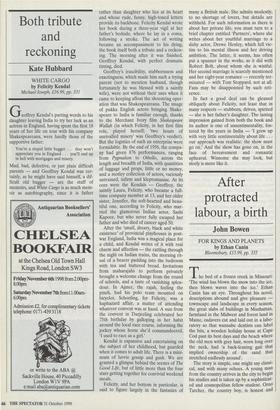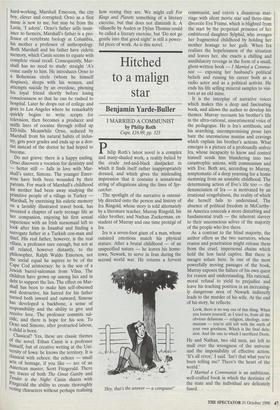After protracted labour, a birth
John Bowen
FOR KINGS AND PLANETS by Ethan Canin Bloomsbury, £15.99, pp. 335 The bed of a frozen creek in Missouri: `The wind has blown the snow into the ice, then blown waves into the ice.' Ethan Canin has an eye. Throughout his novel, descriptions abound and give pleasure — townscape and landscape in every season, the great slabs of buildings in Manhattan, farmland in the Midwest and forest land in Maine, cadavers cut and laid out in a labo- ratory so that wannabe dentists can label the bits, a wooden holiday house at Cape Cod past its best days and the beach where the old men with grey hair, worn long over the neck, had 'a back-leaning gait that implied ownership of the sand that stretched endlessly around'. The story is simple, one might say classi- cal, and with many echoes. A young man from the country arrives in the city to begin his studies and is taken up by a sophisticat- ed and cosmopolitan fellow student. Orno Tarcher, the country boy, is honest and hard-working, Marshall Emerson, the city boy, clever and corrupted: Orno as a first name is new to me, but may be from the Latin, 'I adorn'. Orno's father sells insur- ance to farmers, Marshall's father is a pro- fessor of vertebrate biology at Columbia, his mother a professor of anthropology. Both Marshall and his father have eidetic memory, which Canin seems to equate with complete visual recall. Consequently, Mar- shall has no need to study: straight 'A's come easily to him. He introduces Orno to a Bohemian circle (whom he himself despises), sleeps with his women, and attempts suicide by an overdose, phoning his loyal friend shortly before losing consciousness so that he can be rushed to hospital. Later he drops out of college and goes to Los Angeles where he remarkably quickly begins to write scripts for television, then becomes a producer and sniffs lines of cocaine through rolled up $20-bills. Meanwhile Orno, seduced by Marshall from his natural habits of indus- try, gets poor grades and ends up as a den- tist instead of the doctor he had hoped to become.
Do not grieve: there is a happy ending. Orno discovers a vocation for dentistry and better still — falls in love with Mar- shall's sister, Simone. The younger Emer- sons have both been wounded by their parents. For much of Marshall's childhood his mother had been away studying the primitive people of a village in Turkey Marshall, by exercising his eidetic memory on a lavishly illustrated travel book, has invented a chapter of early teenage life as her companion, enjoying his first sexual experience with an Irish nursemaid left to look after him in Istanbul and finding a surrogate father in a Turkish con-man and thief. His real father, however, is the real villain, a professor sure enough, but not at all related, however distantly, to the philosopher, Ralph Waldo Emerson, not the social equal he aspires to be of the Cape Cod aristocracy: he is the son of a Jewish barrel-salesman from Vilna. The children have grown up among lies and in debt to support the lies. The effect on Mar- shall has been to make him self-obsessed and destructive, his hatred for his father turned both inward and outward; Simone has developed a backbone, a sense of responsibility and the ability to give and receive love. The professor commits sui- cide, and there is hope for his son. To Orno and Simone, after protracted labour, a child is born.
Classical? Yes, these are classic themes Of the novel. Ethan Canin is a professor himself, but of creative writing at the Uni- versity of Iowa: he knows the territory. It is classical with echoes: the echoes — small acts of homage, if you like — are of an American master, Scott Fitzgerald. There are traces of both The Great Gatsby and Tender is the Night: Canin shares with Fitzgerald the ability to create thoroughly vexing characters without perhaps realising how vexing they are. We might call For Kings and Planets something of a literary exercise, but that does not diminish it. A villanelle by Auden or Dylan Thomas could be called a literary exercise, but 'Do not go gentle into that good night' is still a power- ful piece of work. As is this novel.



















































































 Previous page
Previous page